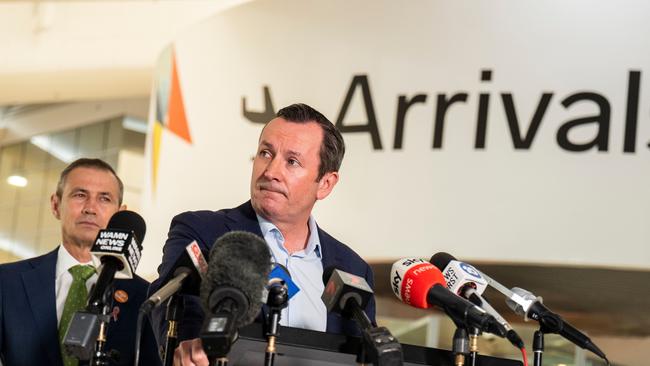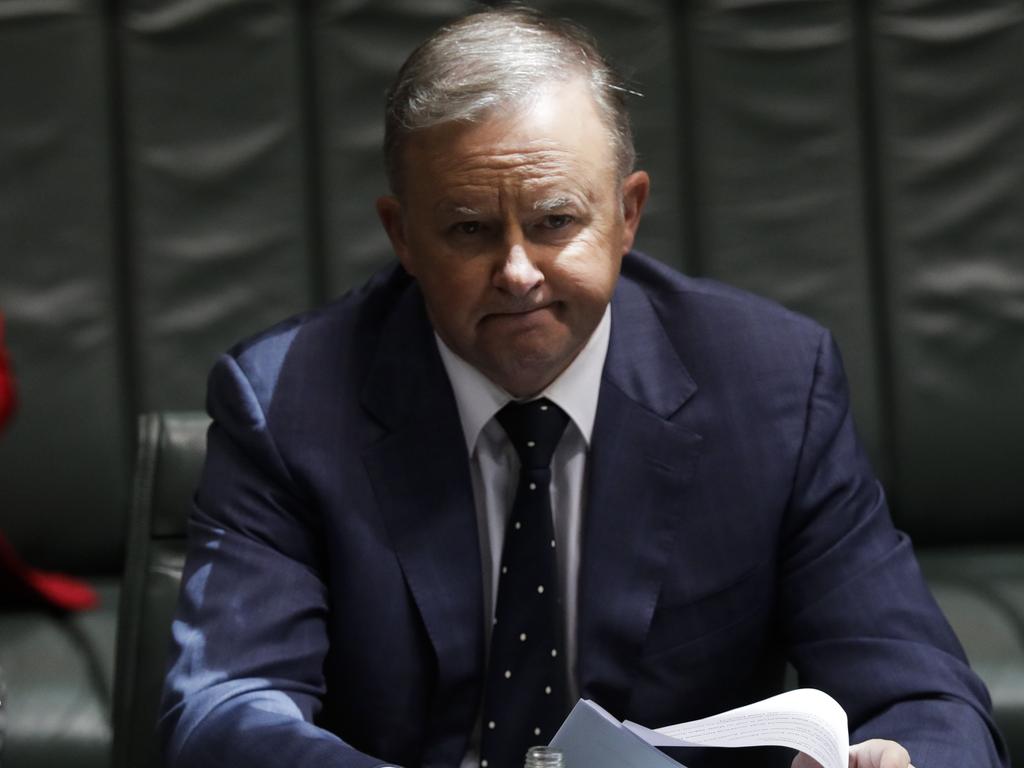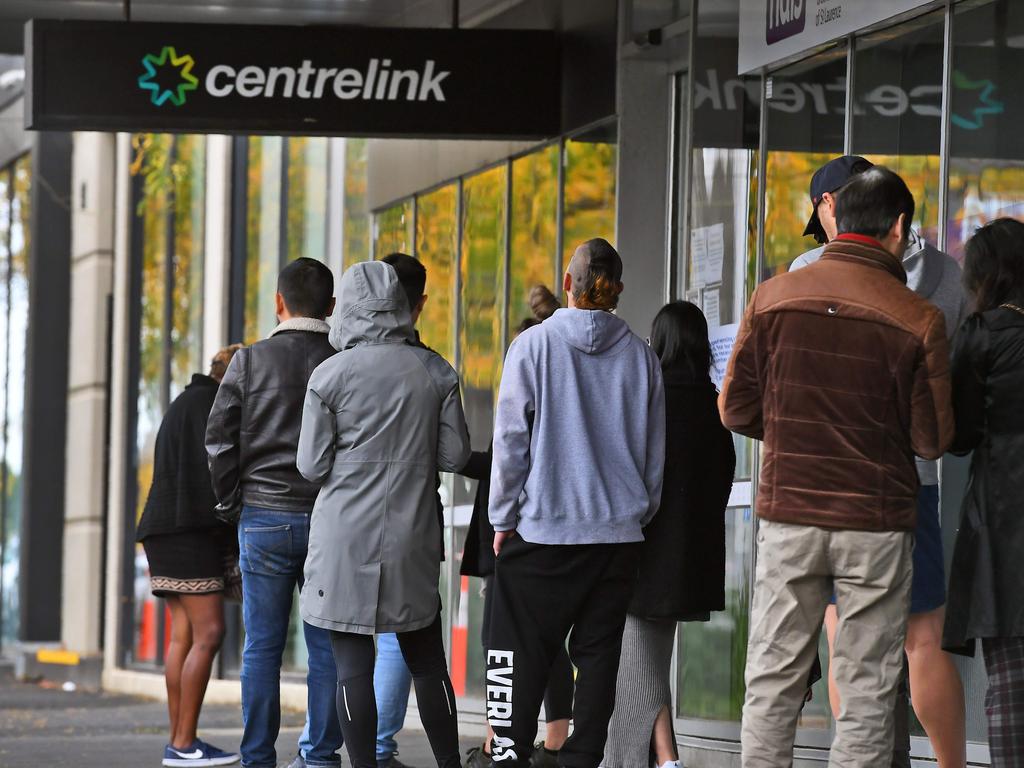Yes, we’re a lucky country … but we’re girt by inanity
To be proud of our nanny-state response to Covid is to be blind to what is happening to our national character.

They all survived, so maybe he was right. Or maybe the same result could have been achieved without the selfishness and panic.
Seinfeld is supposed to be a show about nothing, but it seems to have a scene for every life situation. And George’s display of frenzied cowardice (he was asked afterwards how he lived with himself and said “it’s not easy”) is a useful metaphor for the way most of our state leaders have responded to the pandemic this year.
They will all point to the scoreboard — the lack of community transmissions and mercifully low death tallies — as justification for their hard lockdowns and border closures. But the counterfactual exists, and it is called NSW.
The most populous state has the nation’s highest population density suburbs and has handled the majority of quarantining for people returning from overseas. Yet despite mistakes such as the Ruby Princess and infections leaking from hotel quarantine, it has inflicted fewer restrictions on its population, kept interstate borders open (except to Victoria when it lost control) and weathered the pandemic as well as any other state.
Truth be known, with its diligent contact tracing and detailed public information campaigns, NSW could have coped with this pandemic without the hard lockdown instigated nationally in March as a kneejerk response to social media posts of crowds at Bondi Beach. We will never know.
But we do know that the more liberal approach that operated in NSW, lightening the social, economic and community costs on its people, has not worsened the public health toll. By this rationale and lived experience we can see that other states suffered too much social and economic pain for the same health outcome.
Australians have relinquished a lot to keep infections low. Fiscal discipline has been jettisoned, personal liberties surrendered, tens of thousands of businesses gone, hundreds of thousands of jobs spiked, millions of educations disrupted, and untold personal trauma endured as families have been kept apart even for the most crucial and life-changing events.
But the virus has been suppressed. And vaccines are on the way.
The critical test was always balance. It was never a choice between deaths and dollars, or the coffin shortages of northern Italy and the eerie ghost town of post-outbreak Wuhan — it was about balancing public health and society, coronavirus spread and sustainable community.
Most of Australia went too far — NSW proves that. But even the Premier State probably overreacted, given how little we tested our responses and capacity. (We boosted national critical care beds from about 2300 to more than 7000 to build surge capacity but the pandemic never used more than about 0.5 per cent of those resources at any one time.)
The reflexive response to these arguments is that doing less would have cost more lives. But no, the point is to question if we could have achieved comparable results with fewer ill-effects.
If you argue we must always do all we can to save every life, you must consider the influenza conundrum. About 900 people have died with COVID-19 this year, which is about the same number who died from the flu last year — yet this year, because of coronavirus social distancing, flu-related deaths were fewer than 40.
Clearly we could prevent anything up to 1000 flu deaths annually by locking down. Sure this is what we would do if every life is sacred and governments must do all they can to preserve all lives.
But they do not. Governments make judgments about costs and benefits, degrees of risk, and proportionate responses. If speed limits were set at 20km/h, we would prevent many road fatalities — so why is that not the law? The answers are obvious.

Although the flu kills the young as well as the old, we do not choose to bring the country to a standstill to combat it every winter — instead we spend billions of dollars on vaccine programs. And we accept a proportionate response to a perennial risk.
Catastrophism, panic, fear, authoritarianism and nanny state are words that scream for attention this year, along with positive notions such as community, co-operation and care. For me, however, the word of the year is inanity — so many leaders made silly decisions and too many happily played along.
More than once I filmed interviews with politicians who donned masks for our on-camera discussion but were happy to slip it off as we chatted afterwards. Office buildings are replete with stickers telling us where to stand and queue, and how to avoid choke points, which seems rather unnecessary given so many people are working from home that the hallways are empty. After games of underage footy (thank goodness the season was delayed, not abandoned) my kids were told not to bump fists with the other team, or sing the club song, because, well, yes, because COVID.
Melburnians were not allowed to leave their city, suburb or home, yet still they were subjected to a curfew — just to make sure. They were ordered to wear masks while walking in the open air, even tens of metres from anyone else, and fined for not doing so by a police forced reduced to the pathetic pantomime of arresting women in their homes for posting messages of dissent on social media.
To be proud of this response is to be blind to what is happening to our national character. We were once known as a resourceful, self-reliant and anti-authoritarian people; now we are timid and afraid, and looking to government to indulge and protect us.
This has been the year of the risk managers, human resources professionals and nanny state politicians. It has been the international year of intrusive rules and expensive government interventions, surrendering autonomy, eschewing travel and eliminating risk. It has been the year of infantilism, paranoia and isolation — of hysteria, alarm and inanity.
Just weeks ago, people in Mildura were safe in the knowledge they had no local infections, knowing their sunny, dry climate and sparse population minimised their risk — but by law they were required to wear masks in public. A kilometre away, across the Murray River which serves as a usually meaningless interstate border, their neighbours at Buronga in NSW happily sported naked faces. More than 1600km northeast, on NSW’s northern border, Queensland imposed a hard border and people in Tweed Heads literally needed a permit to cross the street. Queensland, remember, is the “smart state” in the clever country. Beautiful one day, inane the next.
South Australia locked down last month because they had 22 cases from a known and contained cluster, and when the government’s jumpiness was exposed, it tried to blame a pizza delivery bloke who had lied.
In response to this small cluster, the West Australia government threw Adelaide arrivals into quarantine in Perth after taking off lawfully from Adelaide airport. Welcome to a federation.
We have had laws against standing up while you drink, bans on singing at church or dancing at weddings. Yet health departments have issued guidelines for COVID-safe group sex at brothels — handy to know.
Predictably, state governments are slower to forfeit these powers than they were to impose them. WA Premier Mark McGowan chose not attend national cabinet this week lest he break WA health guidelines about avoiding anyone from South Australia — a state of almost two million people that has not had a new infection for almost two weeks.
Rather than interrogate the over-reaction of the states, the media have amplified their alarmism. Whether it is crime, bushfires, climate, recession or a pandemic, we can always rely on media to exaggerate and hyperventilate.
Trouble is that in this social media age, many politicians play the same game as the media, harnessing a zeitgeist of fear rather than accepting the imperfections of life and appealing for calm.
Victorian Premier Daniel Andrews has routinely referred to COVID-19 deaths of people in their 80s and 90s in aged-care homes as “tragedies” — every passing is sad, but we cannot reasonably call such deaths tragic.
We need more public data on causes of deaths rather than alarmist statistics; some Victorian deaths in palliative care were included in coronavirus tallies. This is a state where euthanasia is legal, yet COVID-19 deaths in palliative care are labelled a tragedy. We need to keep calm and carry on.
The truth is we are far better placed than Europe and North America, especially if the vaccines prove successful. But we were never going to experience their dire problems because, unlike them, we were not exposed to massive levels of international arrivals with the virus, in winter, into high density cities.
These countries are in their second winter of coronavirus while we have all summer to prepare and vaccinate. Our island nation status and our warm and relatively dry climate have helped, as has our sophisticated health system.
As leading epidemiologists such as Deakin University’s Catherine Bennett and ANU’s Peter Collignon have pointed out, it is difficult to identify our most effective or ineffectual pandemic measures because our premiers and their medical advisers panicked and kept slapping on more controls before we could see whether the previous restrictions worked. Everyone wanted to lead the way.
(Thanks for reading and responding all year, Happy Christmas and all the best for a testing 2021. CK)







“We needed a leader, someone to lead the way to safety.” So said George Costanza after knocking to the floor children and an elderly woman in a Zimmer frame as he yelled “fire” and rushed from a kitchen blaze during a kid’s birthday party.